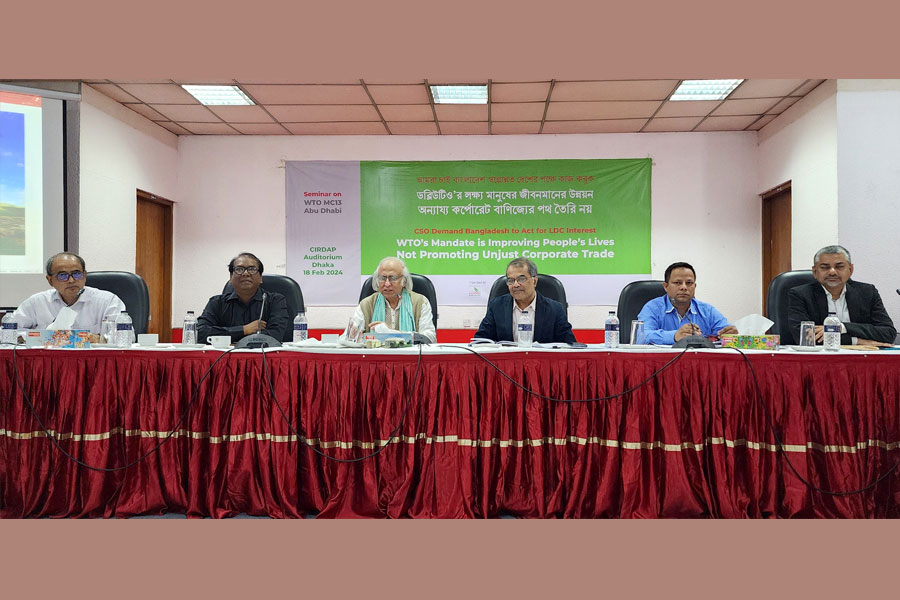WTO’s draft text will obstruct Bangladesh’s fisheries development: Speakers

Published :
Updated :

Bangladesh, as an LDC, has already harvested more than 0.8 per cent of the quota of global fish production, according to the World Trade Organization’s (WTO) proposed text.
Thus, Bangladesh cannot give subsidies to the fisheries sector, Deputy Chief of Fisheries Department (Marine) Mohammad Tanveer Hossain Chowdhury said while speaking at a seminar.
However, the fisheries agreement will not be binding unless all countries sign it within the next two years, he added.
Equity and Justice Working Group (EquityBD), a national platform of CSO and NGOs in Bangladesh, organised the seminar in Dhaka on Sunday to discuss the possible position of the Bangladesh Government delegation that will attend the Thirteenth Ministerial Conference of the World Trade Organization, according to a media release.
The seminar was co-organised by the Coast Foundation and Our World is Not for Sale, an international network working against the unjust global trading system.
Dr Qazi Kholiquzzaman Ahmad chaired the event, while Rezaul Karim Chowdhury, EquityBD’s Chief Moderator, moderated it.
Dr Mohammad Tanveer Hossain Chowdhury, the Deputy Chief (Marine) of the Department of Fisheries, spoke as the panel speaker along with the other speakers, including CSRL's Ziaul Haque Mukta, COAST Foundation’s Deputy Executive Director Sanat Kumar Bhowmik and Internet Governance Forum’s General Secretary Abdul Haque Anu.
Barkat Ullah Maruf of the COAST Foundation presented the keynote at the seminar.
The recommendations for the Bangladesh Delegation to the WTO MC13 mentioned in the keynote presentation include demand for the implementation of the benefits promised at the MC12 to sustain the transition of the graduation of the LDC, demand the developed countries stop subsidies on big industrial fishing, which is responsible for overfishing and depletion of global fish stocks, and increase opportunities and subsidies for small-scale farmers in LDCs, remove barriers for the LDC and developing countries to generate revenue from the e-commerce transactions of big tech companies, Support the demand for public stockholding and food security in the agricultural sector, extending the TRIPS waiver on medicines for the LDC and newly graduated developing countries to ensure poor people’s access to medicines.
Dr Qazi Kholiquzzaman Ahmad said in his speech that dividing the countries into LDCs or developed countries is humiliating.
All are developing countries in one way or another. When a low-income country is called an LDC, its dignity is undermined. In 1971, Bangladesh refused to accept the LDC status, he said.
However, we were forced to take this identity later in 1975. These divisions thus disadvantage low-income countries in favour of global trade and power structures, Ahmed added.
CSRL's Ziaul Haque Mukta said all the LDCs, even some of the developing countries, should have full market access to the markets of developed countries.
They are entitled to this benefit apart from special and differential treatment, he said.
However, some rich countries unfairly deprive Bangladesh's RMG products of that advantage. In this regard, Bangladesh should be able to file a complaint against them using the WTO's dispute settlement procedure, he added.
Rezaul Karim Chowdhury of EquityBD said that since 2005, the COAST Foundation has been working on and talking about WTO issues and Bangladesh's expected position there.
“If our government delegation informs us what position it will take there, we can help them.”


 For all latest news, follow The Financial Express Google News channel.
For all latest news, follow The Financial Express Google News channel.